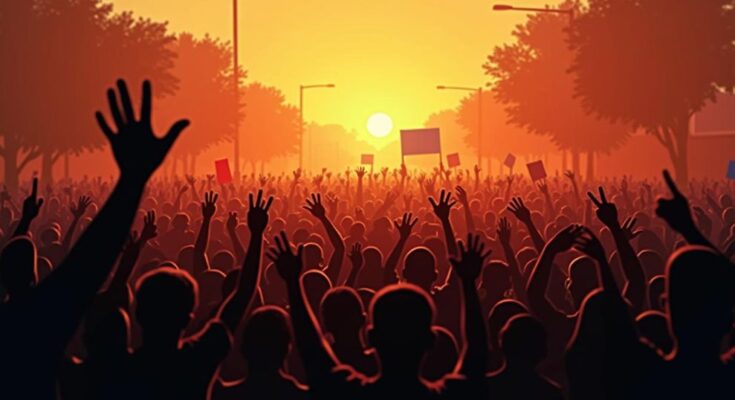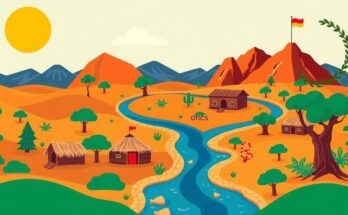Opposition groups in Venezuela protested on Saturday against President Nicolas Maduro’s claim of election victory two months after a contested presidential election. Opposition leader Maria Corina Machado, in hiding, called for smaller protests amidst ongoing repression. The opposition contends that their candidate won the election, while Maduro’s supporters celebrated. International calls for dialogue have intensified as tensions remain high in the nation.
On Saturday, various opposition groups held protests in Venezuela, coinciding with the two-month mark since the contentious presidential election in which President Nicolas Maduro asserted his victory. Opposition leader Maria Corina Machado, currently in hiding after labeling the election results fraudulent, encouraged smaller demonstrations to mitigate the risk of violent crackdowns, which were prevalent during earlier protests. Approximately 30 individuals gathered in a plaza in Caracas, voicing their dissent. Among them was Leida Brito, also referred to as the “Red Helmet Grandmother” due to her long-standing anti-government activism. She expressed her views, stating, “Nicolas Maduro should leave because he lost,” while holding a placard proclaiming, “To defend the vote is a right.” Retired Colonel Hidalgo Valero pointed out the increasing fears within Venezuelan society, stating, “The freedom of Venezuela is in danger. Today our people are afraid to be in the streets because there is tremendous repression.” Maria Corina Machado shared her sentiments through a voice note, emphasizing the resolute spirit of her supporters: “Here we are standing firm, advancing every day with more strength and enthusiasm, gathered here as the brave and good Venezuela.” In the aftermath of the disputed election, numerous opposition figures have faced arrest, with over 2,400 individuals accused of terrorism for their roles in the protests, resulting in at least 27 casualties. The opposition claims that their candidate, Edmundo Gonzalez Urrutia, was the rightful winner of the July 28 election, receiving 67% of the vote according to their own tally. Conversely, the pro-government National Electoral Council announced Maduro as the victor with 52% without providing the exhaustive voting results mandated by law. Gonzalez Urrutia, a 75-year-old retired diplomat, has sought asylum in Spain following weeks of evasion. Massive protests were reported not only in Venezuela but also in cities like Mexico City, Buenos Aires, Panama City, and Montevideo. In Madrid, Gonzalez Urrutia was seen greeting supporters who displayed the Venezuelan flag. In a counter-movement, hundreds of Maduro’s supporters organized a march in Caracas to celebrate what they perceive as an electoral victory. Maduro, addressing the crowd, derided Machado, stating, “the supposed queen bee… is beginning to pack her Gucci suitcases … she is preparing to leave, too.” He asserted, “We are not in Madrid, we are not hiding, we are in the street.” Recently, a coalition of around 30 nations led by the United States and Argentina implored Maduro to initiate dialogue with the opposition. They issued a statement advocating for “constructive and inclusive discussions” regarding a democratic transition and the immediate release of individuals detained post-election.
The political landscape in Venezuela has been fraught with contention, culminating in the July 28 presidential election, a pivotal moment marked by accusations of electoral fraud. President Nicolas Maduro’s declaration of victory has met with vehement opposition, leading to protests and confrontations. Maria Corina Machado, a key opposition figure, has faced threats to her safety as she stands against what many see as a regime intent on suppressing dissent. The aftermath of the election has precipitated significant unrest, with various human rights concerns arising due to the arrest and persecution of opposition leaders and ordinary citizens alike.
In summary, the ongoing political turmoil in Venezuela reflects deep divisions in the wake of the disputed presidential election. Opposition leaders continue to rally support, despite the risks of repression and violence, while Maduro’s administration clings to its claim of legitimacy. The international community’s calls for dialogue between the government and opposition may offer a glimmer of hope for a resolution, yet the path to democratization remains fraught with challenges.
Original Source: www.voanews.com




